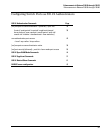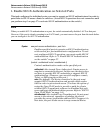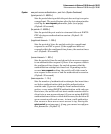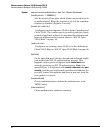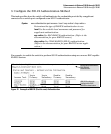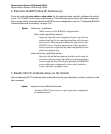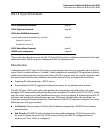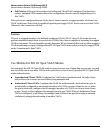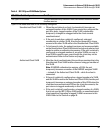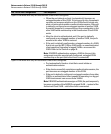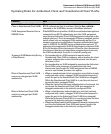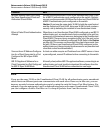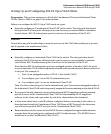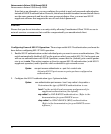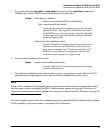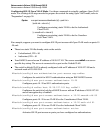
46
Enhancements in Release F.05.05 through F.05.70
Enhancements in Release F.05.05 through F.05.60
Table 4. 802.1X Open VLAN Mode Options
802.1X Per-Port Configuration Port Response
No Open VLAN mode: The port automatically blocks a client that cannot initiate an authen-
tication session.
Open VLAN mode with both of the following configured:
Unauthorized-Client VLAN • When the port detects a client, it automatically becomes an
untagged member of this VLAN. If you previously configured the
port as a static, tagged member of the VLAN, membership
temporarily changes to untagged while the client remains
unauthenticated.
• If the port already has a statically configured, untagged
membership in another VLAN, then the port temporarily closes
access to this other VLAN while in the Unauthorized-Client VLAN.
• To limit security risks, the network services and access available
on the Unauthorized-Client VLAN should include only what a client
needs to enable an authentication session. If the port is statically
configured as a tagged member of any other VLANs, access to
these VLANs remains open, even though the client may not be
authenticated. Refer to the Caution on page 45.
Authorized-Client VLAN • After the client is authenticated, the port drops membership in the
Unauthorized-Client VLAN and becomes an untagged member of
this VLAN.
Note: If RADIUS authentication assigns a VLAN, the port
temporarily becomes a member of the RADIUS-assigned VLAN
—instead of the Authorized-Client VLAN—while the client is
connected.
• If the port is statically configured as a tagged member of a VLAN,
and this VLAN is used as the Authorized-Client VLAN, then the port
temporarily becomes an untagged member of this VLAN when the
client becomes authenticated. When the client disconnects, the
port returns to tagged membership in this VLAN.
• If the port is statically configured as a tagged member of a VLAN
that is not used by 802.1X Open VLAN mode, an unauthenticated
client capable of operating in tagged VLANs has access to this
VLAN. Refer to the Caution on page 45.



